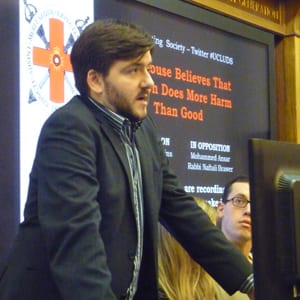How do you define religion?
By news editor, on 4 February 2013
![]() Written by Hannah Edwards, UCLU Debating Society President 2012–2013
Written by Hannah Edwards, UCLU Debating Society President 2012–2013
On Monday 21 January, UCLU Debating Society held the debate: ‘This house believes that religion does more harm than good’.
Four distinguished guest speakers had been invited to discuss the topic. Speaking in proposition was Professor Peter Atkins, eminent chemist who regularly writes on the incompatibility between science and religion, and Andrew Copson, CEO of the British Humanist Association.
In opposition was Mohammed Ansar, legal advocate and visiting lecturer on islamophobia, and, alongside him, Rabbi Naftali Brawer, CEO of the Spiritual Capital Foundation and ordained orthodox rabbi.
The middle ground
In a debate as broad as this, there will always be a few points of agreement between both sides. Firstly, no one contested the point that religion does bring benefits to society. Professor Atkins credited religion with the development of modern society and science.
In addition, no one argued with Mohammed Ansar when he stated that the charitable work accomplished by religious groups is incredibly important to society. Why does it matter if an individual’s motive for ‘doing good’ comes from their religion?
The second main point of agreement was that many groups have caused harm. Andrew Copson and Rabbi Naftali both spoke about the danger of “fanatical groups” and all sides agreed that there are many examples of cultural, political and racial groups of fanatics that have caused a great deal of harm in addition to religious ones.
Points of clash
The fundamental issue in this debate was what exactly religion is. It became very clear that religion means a completely different thing to every individual. Rabbi Naftali described it as a “partnership between the human and the divine, not one above the other”.
This was in direct contrast to Professor Atkins who stated that “on the grandest of scales, religion undermines the human mind by propagating superstition over the rational understanding of nature”.
The difficulty in comparing these two ideas is that they are talking about different definitions of religion: an individual’s interpretation versus an organised group. Mohammed Ansar accused the proposition of defining religion as “everything including the kitchen sink”.
This point was raised throughout the debate including several floor speeches – most memorably when student Yisroel Greenberg challenged the audience that “if you want to know about my religion, ask me about it. There are not 20 or 30 perceptions of religion. There are billions.”
The next main point of clash revolved around the balance between harm and good. Andrew Copson began the debate by stating that “religion is incidentally good”. He challenged the basis of morality and suggested that “good people do good, bad people do harm but for good people to do harm you need religion”.
In contrast, Rabbi Naftali stated that “religion offers a powerful, profound framework for people to be moral” although he did agree that people can do good without religion.
Mohammed Ansar supported this and also propagated that many problems in society have been created by “a lack of religious morality”.
Finally, the discussion over how religion affects the rest of society was highly contentious. One of the fundamental points of Professor Atkins’ speech was how religion affects the present and future.
The banning of contraceptives and the investigation into stem cells were two key examples he used to highlight this.
Rabbi Naftali argued that religion is dynamic, not static, therefore the way it has affected society in the past cannot be taken as a template for the future. In a floor speech, student Emily Stiff raised the issue of when religion is tied into the creation of laws and the politics of a country.
Abstention speeches by students Robert Rampton and Alex Harris suggested that we can never truly know the effect of religion because we don’t know what society would be like without it.
Let battle commence
One of the most significant aspects of parliamentary debating is that you only know the motion 15 minutes before debate commences. In contrast, the time allowed to prepare for the public debates sometimes results in them falling victim to a ‘battle of statistics’.
We shouldn’t ignore statistics but unfortunately in this debate the statistics produced by either side just seemed to disprove each other – leaving the audience (and the chairs) sceptical of both.
It is always nice to have the audience on your side, regardless of whether they completely agree with your argument.
Professor Atkins began his speech with a direct response to Rabbi Naftali by stating that “he (Professor Atkins) stands before us a mean spirited person”. You could visibly see the audience warm to his honest approach.
Later in his speech, he also contributed to my belief that if you want to get the audience to smile, a cleverly placed mention of scientology or George W Bush is a very safe place to start.
The results
Opposition: 40 votes
Abstention: 73 votes
Proposition: 122 votes
Overall, the debate generated a record attendance of more than 235 people! Thank you to everyone who attended and particularly those who participated.
 Close
Close


